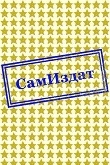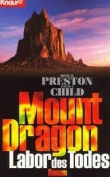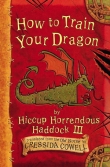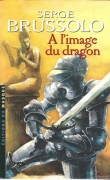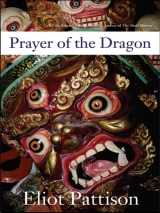
Текст книги "Prayer of the Dragon"
Автор книги: Eliot Pattison
Жанр:
Полицейские детективы
сообщить о нарушении
Текущая страница: 14 (всего у книги 24 страниц)
“She wouldn’t steal,” Hostene said in a worried voice.
“What do they mean,” Shan asked, “the words she wrote?”
“They are from a prayer used by my people, for summoning the holy ones,” Hostene replied.
They moved quietly, pausing at every outcropping that offered cover, aware that Gao had promised to put a guard at the passage, not knowing how far in front of them Abigail was, but knowing that she was not alone. Thomas’s bedroom had been empty as well.
They waited for a cloud to cover the moon before they ventured to the last outcropping before the summit, then watched, waiting. As the moon reappeared, Hostene uttered a hoarse gasp and pointed to a shape lying beneath the cartoonlike painting of the Buddha. Shan thought it could be a rock at first, then saw the glow of teeth near the ground.
Hostene rushed forward. “My God!” he moaned. “What have they done?”
Shan’s stomach almost turned as he saw the small fleshy kernels oozing out of the soldier’s hairline. But then he sniffed. As he took the man’s pulse he noticed two cylinders lying on the ground. “It’s not what you think,” he explained to Hostene. “Someone threw cans of corn at him. One hit the rocks and exploded. He probably bent to investigate and was hit on the head with the second. But his pulse is strong.”
Hostene helped Shan to clean the man’s head and prop him up. Shan took the rifle that lay beside the soldier, removed the clip of bullets from the weapon, pulled the spare clips from the man’s belt, and threw them all high overhead, out of sight. Hostene removed a small, high-power flashlight from the soldier’s belt and switched it on. Together they entered the shadowy passage.
They moved quickly, both men stumbling frequently on the loose gravel underfoot, Hostene pausing sometimes to shine the light behind them, certain he heard sounds of pursuit.
When they reached patches of soil, Shan took the flashlight and examined the ground. The first prints, of Abigail’s boots, were single sets. A second set appeared later, often superimposed on the first. But after a mile the tracks proceeded side by side. Thomas had followed, then caught up with Abigail.
“He’s running away from his uncle,” Hostene said.
“Not exactly,” Shan replied. “Running away is part of it. But he could have gone in any direction, all of which would have been safer than this one. He followed her to protect her. A brave thing, considering he has seen the killer’s work up close.” Shan paused. “What is it, Hostene?” he asked. “Why is it so urgent for Abigail to complete her work on the other side?”
But Hostene didn’t answer as he passed Shan and entered the darkness.
The Navajo waited for Shan to cross the ladder bridge first, then began his transit, upright this time. He was nearly at the far end when he froze. An owl, the biggest Shan had yet seen on the mountain, came flying straight at him, nearly touching his scalp with its talons as it swooped by, then wheeled and returned in the direction from which it had come. Hostene began to lose his balance, his arms flailing the air, his body swaying, the flashlight flying out of his grip.
Shan darted back onto the ladder, grabbing Hostene’s arm an instant before it seemed he would surely fall onto the sharp rocks below. But as he did so, the dry old wood began to crack under their combined weight. When they reached the end of the ladder Shan pushed Hostene forward and leaped onto the rocks.
Hostene soon assumed the lead again, moving more rapidly, as if he sensed a destination close ahead. When they emerged from the cleft in the rock wall, the sky had taken on a bright predawn blush, lighting three lanky shapes lurking at an outcropping fifty yards away. The wolves were hesitant to leave, not reacting to the first stone Shan threw at them, only trotting away when both men moved closer and began pelting them with gravel.
As Shan watched, the animals stopped and looked back with fear in their eyes, not at him, but at the shadows beyond the outcropping.
It wasn’t fear Shan felt as he saw what lay behind the rocks, it wasn’t fear that sapped his strength so quickly that he fell to his knees. It was the black mood that had seized him the night before, his bleak despair now redoubled, hitting him like a club, roiling his stomach, numbing him.
Thomas had a slight grin on his face, frozen in place, as if he thought his assailant had been joking with him. His eyes stared vacantly into the dawn sky. A stream of blood trickled from his scalp, though it seemed unlikely the blow to the head had killed him, for the large pools of blood at the ends of his outstretched arms and the stains on the adjoining rocks showed that his heart had still been pumping when his hands were severed.
Chapter Eight
Shan meant to stop Hostene from entering the little rock-walled chamber but he was unable to make his body act. The old Navajo stood beside him uttering an anguished moan then, staggering, dropped onto a rock. When Shan was finally able to move, he looked up to see Hostene staring at the corpse, a single tear rolling down his cheek.
“Abigail,” he said in a hoarse voice.
“This time,” Shan said, “I think the killer did take her.” He gestured into the shadows where a pack of hair ties, a small battery, and a toothbrush lay on the ground. Someone had tipped over Abigail’s pack.
Hostene wiped his cheek. “We have to follow, quickly.”
“There will be no trail. And if he wanted her dead, she would be lying here beside Thomas. Can you find that cave again, Rapaki’s cave?” Hostene nodded. “Then you must go there and bring back Yangke, as fast as you can. But if you see any miners you must hide.”
Hostene nodded again. Before he left the rock circle he picked up Abigail’s toothbrush and pocketed it, then surveyed the sky, wary not of killers but of owls.
Swallowing his despair, Shan studied the scene, retracing the two sets of boot prints that led from the passage to the cluster of rocks. Abigail and Thomas had stopped, taken several small, shifting steps as if undecided about something, then walked straight to the rocks, as though someone had called them. While the killer was performing his grisly work, what had he done with Abigail? She owed Thomas a debt. Shan did not think she would have fled if she had seen him attacked. Had the killer knocked her unconscious, then bound and gagged her? Or had she been bound and gagged but awake, forced to watch as the killer stretched out each of Thomas’s arms and butchered him?
Shan fought down another wave of nausea, then forced himself to study the bloody stumps at the end of Thomas’s arms. The left had been taken off with one clean chop, the right with two, leaving an uneven line on the bone where the blade had stopped the first time. The edge of the blade had been chipped, which probably meant it was made of either cheap steel or old, brittle, forge-worked metal. The tight pattern of blood reached across the ground onto a rock five feet away, leaving no doubt that Thomas had been alive when his hands had been amputated. But even with such ghastly injuries, a youth in prime health might have survived. Shan bent over Thomas’s head, noting for the first time the burst capillaries in his corneas, the discoloration around his mouth. With another chill Shan looked back at the hair ties and the battery on the ground. He remembered seeing them in the granary. They had been in a plastic bag. The killer had been patient, proceeding as if he had all the time in the world. He had covered Thomas’s head with the bag and waited for the unconscious, bleeding youth to suffocate.
Shan’s legs became weak twigs. He lowered himself onto the ground, staring, unfocused, at the boy. Thomas had been so alive, so full of defiance and ambition, much like Shan’s own son. He had been beaten down, had reacted by fleeing, escorting his new American patron to the deadly side of the mountain. Only the day before his uncle had told him he was finished with his childhood.
When Shan finally found the strength to rise, he walked in ever-widening circles around the site of the murder, eventually finding the plastic bag tucked into a crack in a large boulder. Except for a few drops of blood in a line leading up the slope there were no tracks, no evidence of the direction the killer had taken, no sign at all of Abigail Natay. Thomas and Abigail had been doomed the moment they had stepped out of the narrow passage. But how did the killer know they were on their way through the passage? No one should have expected them, they were meant never to return to the western slope again. But the miners had been prowling, filled with blood lust. A miner from Little Moscow could have been there, waiting for Shan and Hostene. Thomas might have been his poor second choice, when his intended targets did not appear. But the hands! Even if a miner seeking revenge had severed the hands, surely he would not have taken them away.
The ledges of rock would have afforded an untraceable route for anyone leaving the scene. The short line of blood, probably drops from the severed hands, led upward toward the miles of rugged, undulating terrain that rose toward the summit.
Gravel rattled behind him. Shan spun about to see Yangke, slowing from a frantic pace, bent over, hands on knees, panting.
“You have to go to the village, to Chodron,” Shan said.
“I’d rather seek a pack of wolves.”
Shan’s reply was to gesture toward the outcropping. “The bridge ladder is gone. Even if it were still there, we couldn’t carry a body across it.”
Yangke’s eyes filled with pain. Shan did not follow him into the circle of boulders but waited, watching the slopes, wondering what reason a man could have for collecting human hands on Sleeping Dragon Mountain. When the Tibetan finally reappeared his face was drained of color. He walked as if the canque were on his neck once more. “It’s him, isn’t it? The Gao boy. This is the end of everything. The army will take over both sides of the mountain now.”
“Go. Tell Chodron who the victim is. Tell him to send four men with a blanket and two poles, for a stretcher. Tell him to reach Professor Gao on his radio, but only Gao, no one from down below. Gao should bring a helicopter to Drango in”-Shan did some quick mental calculations-“six hours’ time. I will go to the cave for Lokesh.”
Yangke glanced forlornly back toward the body. “There’s no point. You should run. Get your friends and flee. I remember hearing about a Chinese prince, centuries ago. He was murdered in a village somewhere. The emperor couldn’t tell who was responsible so he had everyone in the village killed. Whoever murdered Thomas has killed us all.” Yangke looked longingly toward the wild mountains to the south, where a man could lose himself, then back at Shan. He began to trot down the trail toward Drango village.
It was a slow, silent procession. Four men carried Thomas’s body tied to the makeshift stretcher, Shan and Yangke alternately bearing Lokesh on their backs. Even Chodron was pale and subdued when he met them at the top of the fields. He ignored Shan who was walking beside the stretcher. He had arranged a plank table by one of the stone granaries and covered it with a piece of black felt.
The headman did not object when Shan and Lokesh headed toward the stall where Gendun remained under guard. The lama appeared to be reading the unbound sheets of a text propped before him on a milking stool. But he was not reading, only staring at them, unfocused, one hand trembling uncontrollably. He was propped up with rolled blankets, as Hostene had been when Shan first saw him. Shan had never seen Gendun look so frail. After an earlier dose of tamzing torture this sometimes happened. It had taken time for the damage to manifest itself.
Lokesh touched the lama on the knee. Gendun slowly came to his senses, raising his head with what seemed great effort. “Dolma visits me,” he reported, his voice thin but steady. “Yesterday we polished the prayer wheels in the temple.” Shan and Lokesh exchanged an alarmed glance.
“Rinpoche!”Shan cried, using the term for a revered teacher as he touched Gendun’s hand. The lama did not respond, did not even seem to take notice when Shan pushed up his sleeve. Shan’s heart lurched as he saw the marks-new bruises and electrical burns. He had thrown away the battery but Chodron still had his generator.
Lokesh fell into the quiet rhythm of a mantra to the Compassionate Buddha. Gendun’s lips moved but his eyes were empty. Shan found his own lips mouthing the words as he fought to control the flood of emotion, first anger then deep helplessness. He could do nothing. The more he protested, the worse it would be for Gendun. He heard a dull, staccato rumble overhead. By the time he reached the landing circle the helicopter was on the ground and Gao stood before the makeshift bier. He examined his dead nephew without expression, then somberly studied those who had gathered around the table.
Shan did not move when Gao reached him, did not react when Gao, his face like a gray mask, raised his hand and slapped him. He stood still as a post when the scientist slapped him again harder, a third time still harder. Finally, Gao broke away and disappeared behind the granary. Chodron dispersed the crowd as Shan helped two soldiers wrap Thomas’s body in the black cloth and carry it into the still-whining helicopter. When Shan descended another soldier was there, holding a set of manacles. Shan silently extended his hands and watched without expression as the soldier locked them around his wrists and walked away. The villagers stared at him, stepping fearfully aside when, like a dutiful prisoner, he followed the soldier with the key. No one met his eyes. He had been claimed by the government and, with the final snap of the steel bracelets, had become nobody. He was a number again, nothing more.
The soldier led him to Gao, now seated on the same flat rock Lokesh had been perched on when Shan first arrived in the village. Gao’s face was gaunt, no expression, not even sadness in his eyes.
“When Public Security comes,” Shan said, “they will sweep the slopes and arrest everyone. There will be forced confessions. A heavy price will be exacted.”
“Listen to you.” Though Gao’s face seemed numb, his voice overflowed with bitterness. “Suddenly, the careful politician.”
“Leave the village alone. These people suffer enough.”
“But you told me before, they tortured your lama, they were going to kill Hostene. Why should you care?”
“Even so. .” Shan didn’t finish the sentence. He lowered himself onto the rock beside Gao. It was a quiet season for Public Security, and their Ax to Root campaign still needed to gain momentum. There was not a shadow of doubt that once senior officials outside Chodron’s sphere caught scent of Drango, the village would be obliterated. There would be photographers, perhaps even a film crew, certainly speeches about progress and the twenty-first century. The inhabitants would be herded out, perhaps on two hours’ notice, then a reconstruction brigade would arrive, possibly prisoners who were themselves Tibetan. Shan had seen it before, had been in such a brigade when it was ordered to such duty in the hills above their compound, had watched Lokesh and the other old Tibetan prisoners weep as the prison guards started the process by throwing torches into centuries-old wooden homes.
“Don’t you realize that the man who did this is too clever to be caught by a sweep?” Gao said after a long silence.
“Criminal justice in China is an approximate thing. I didn’t say he would be caught, I said a heavy price would be paid.” Shan gazed out over the distant ranges. “If Thomas is looking down on us,” he ventured at last, “there would be something more important to him than finding his killer.”
“You mean the Navajo woman.”
“She is up on the mountain. I think she is still alive. She crossed paths with the killer before and was spared. But this time I think he took her with him.”
“Why would he do that?”
“I don’t know exactly. He needs her for something.”
“What are you trying to say?” Gao asked after another long silence.
“Hostene and I can find her. When we find her we will know who the killer is.”
“If I let you go, I will never see you again. That’s what convicts do in Tibet. Disappear.”
Shan lowered his head into his hands. His body was fatigued. But his spirit was beyond exhaustion. “How many years did it take,” he asked, “to find the old dzong you live in?”
Gao did not reply.
“When they come,” Shan continued, “they will also find out about the gold. Not even the army will be able to stop what will happen then. Maybe it could have twenty or thirty years ago, but not today. Economic development is Beijing’s new mantra. The first year or two they will just send survey teams. There will be helicopters coming and going overhead. Geologists will drill and blast. After that, they will build roads, with bulldozers and more dynamite. They’ll assign a gulag crew to do the work for a year or two, maybe three or four hundred prisoners, so they’ll probably build a prison camp right here at the village site. A new town will go up, built of metal and concrete. A depot, a garage, dormitories. Then the real work will begin. Scores of miners. More dormitories. Huge trucks to move the material as it is blasted loose. After they deplete the seams and have sluiced the dust in the streams, they’ll pick a small valley in which to heap the soil they strip from the slopes, then spray it with sodium cyanide to leach out the ore. They won’t stop until there is nothing left but bare, sterile rock. Once they start, a Tibetan mountain lasts about a dozen years.”
Shan never heard the angry words forming on Gao’s lips. Chodron had appeared, accompanied by two of his men. The headman pointed at Shan. “He’s mine. He has already been arrested by the civil authority. I released him on his parole, to assist me.”
“Already arrested?” Gao asked, suppressing his rage. “On what charges?”
Chodron swallowed hard and pressed on. “Interfering with municipal government. Violations of the Ax to Root directive.”
“Ax to Root is a campaign,” Gao pointed out, “not a criminal law. A campaign against Tibetans. Shan is not Tibetan.”
“He has no government registration. He is nothing, an escaped convict. Leave him with me and we will find the bastard who did this to your nephew. I have already started an investigation. I know what to do with men like Shan.” Gao’s silence was making Chodron nervous. “Do not blind yourself to the truth, sir.”
“What particular truth am I missing, Comrade Chodron?” Gao asked.
“Your nephew would still be alive but for Shan. He may have been a Beijing investigator once, but not now. Once a criminal, always a criminal. People like you and me are his enemy. He stirs things up, he breeds instability. He cares nothing about the laws of Beijing anymore. He does not intend that the murderer be sent before a Chinese judge.”
“Deny these things,” Gao demanded of Shan.
Shan looked toward the distant mountains. “I am not your enemy,” he said.
“Would my nephew still be alive if you had not gone up the mountain?”
“I don’t know,” Shan’s voice dropped to a whisper. “Probably. I went up the mountain to find answers. The killer was feeling pressured. If Hostene and I don’t go back, his niece will certainly die.”
Chodron said, “Shan may have murdered your nephew.” He leaned toward Gao. “I could easily write a report for Public Security. Shan was in the area, had access to heavy blades, had a simple motive. He had been found out. Was this killing an unreformed convict’s last desperate attempt to keep from spending the rest of his life in prison? Was there a conspiracy between Shan and this Hostene? Perhaps Shan took a bribe to cover up the evidence that Hostene killed his two companions. Then he had to silence your nephew because he was conducting his own investigation and had discovered the terrible truth. A convict and an illegal foreigner-the kind of solution Public Security welcomes.”
Chodron turned to Shan. “A simple confession will prevent unnecessary suffering by your two old goats.”
Shan searched Chodron’s face. He saw movement behind the stable. Two of the headman’s men were carrying Gendun, who was limp as a sack of rice.
Shan took a step toward the lama.
“The other one, Lokesh,” Chodron added, “his turn comes next. I recall that he was quite rude to me that night you arrived.”
Shan was unable to speak. He jerked the chain tight between his manacled wrists, his fists clenching and unclenching. He had thought when he discovered Thomas’s corpse that things could not get worse. But now he stood in chains as Chodron demanded that he confess to murder to save Lokesh and Gendun.
Someone moved between Shan and Chodron. Gao. “We will allow Shan and the American to go up the mountain again,” the scientist declared. “They can have seven days, no more. Put the manacles on the two old men who are his friends. Treat them as prisoners awaiting Public Security.
“If anything happens to me or to Kohler, or if they are found on the eastern side of the mountain again, or if Shan does not return in a week, the two old men are to be surrendered to Public Security. Major Ren is touring the district. He is responsible for Ax to Root in this region. He will know what to do with them.”
“Ren,” Chodron muttered with a grunt that seemed part satisfaction, part fear.
Gao did not look at Shan as he continued. “When Shan returns, he will be given a choice. He can surrender to me and I will send him to Beijing, where he belongs, to learn how to serve his government once again. Or he can surrender to you and return to prison.”
Shan’s throat went dry as a stone. “You won’t call Public Security for a week?”
“Not unless Kohler or I am endangered.” Gao exchanged a glance with the headman. “Or Chodron.”
A delicate, treacherous bargain was being struck between Chodron and Gao. Shan was the prize.
“No,” Shan said.
“No? It is not yourdecision!” Chodron said.
“I will not sign a confession. And I will not go after the killer unless Lokesh and Gendun are unchained and put under Dolma’s care and provided with whatever she says they need. And no more tamzing.”
Shan braced himself as Chodron swung back his open hand. But Gao caught the headman’s arm. “It will take a criminal to catch this criminal,” he said.
Chodron replied, “The manacles stay on the lama. A guard stays at the door. They may not leave Dolma’s house.” He glared at Shan, then accepted the key extended by Gao. “Three sessions of tamzing are sufficient for now,” Chodron added with a satisfied air as he released Shan from the handcuffs. “Come back without the murderer and there will be three more sessions.”
Shan gazed at Gendun. Three more sessions would kill the old lama.
Chodron announced in a suddenly cheerful voice, “In another week, we celebrate the annual harvest festival. This year’s is our best harvest ever. We will also celebrate the solution of the murders. We will celebrate the compassionate power of our elders in Beijing.”
Gendun lay on a pallet, Lokesh at his side, as Dolma heated tea on a brazier by the open window. Gendun’s cheeks were discolored in several spots, his forehead was creased, a sign of the lama’s silent battle to control his pain. He seemed weak and fragile. He appeared, Shan realized, with a wrench of his gut, exactly like the Tibetan prisoners he had lived with in the gulag, the old lamas who had slowly withered before his eyes. He had buried so many of them he had lost count.
“Chodron found two shepherds counting prayer beads,” Dolma reported in a tormented tone. “A family had mounted an old rusty prayer wheel at their front door. He was furious. He burned the beads, smashed the wheel, then dragged Gendun out into the street, saying it was all his fault.”
As Shan lowered himself beside the lama his hand reached out of its own accord and cradled Gendun’s, a chain around it now. He recalled with a numbing sense of defeat the way his father had lain dying after he had been beaten by the Red Guard. Shan had sat helplessly, squeezing his father’s hand for hours, until with a terrible rattle that still echoed in his nightmares the professor had breathed his last.
“We are brewing teas used by the old healers,” Dolma said with a nod toward Lokesh, who chanted a mantra for the medicine deity. The widow busied herself among the small crocks and jars that lined a shelf below the window. At first Shan thought her preoccupation was with the teas, then saw that she fidgeted with a cleaning rag, twisting it in her fingers, casting nervous glances out the window. Shan rose and stepped to Dolma’s side. “I need to understand your nephew, Tashi,” he said in a low voice. “What did he do when he left the village?”
She scrubbed her eyes with her apron. “He was a good boy, Yangke’s best friend. Ten years ago, Yangke came back from the Chinese school Chodron had sent him to. He had many problems there, always being disciplined, refusing to respond to the Chinese name assigned to him, protesting when they punished him for speaking Tibetan. But he had the best grades in all his class, and they are always looking for Tibetans to go to the universities in China. Chodron announced that he had arranged for Yangke to attend university in Sichuan Province, that our village was honored to have one of its own selected by the government. But at the celebration Chodron held for him, Yangke announced he had already been accepted somewhere else, as a novice in a monastery near Lhasa. Chodron was furious but the next day Yangke left for the gompa. Only later did we discover that he had persuaded Tashi to go with him. But being a monk didn’t suit Tashi. After a few months he left for a job in a factory.”
“And he got into trouble there?”
“He was never happy. He loved drawing. He always kept his pen case with him. He would have become a great painter of tangkas if. . if things had been different. When he left all he took with him was that old silver pen case. They say he committed a crime that had something to do with the black market, with shipping stuff across the border. He was found guilty of falsifying export documents and sentenced to three years in prison.”
“What prison?”
“In the west, near Rutok,” the old woman said. Rutok was the largest city in remote western Tibet, home to many hidden military bases and gulag prisons.
“And when was he released?”
“I don’t know exactly. He sent us postcards once every few months to let us know he was still alive. He was driving trucks for a factory, he said. The last time I saw him was on the anniversary of his mother’s death, two years ago. He brought me something from far away.” Dolma rummaged for a moment on her shelf, pushing jars aside, finally producing a little porcelain reproduction of the Taj Mahal. Tashi had been in India. But as a convicted felon, he would never have been legally permitted to drive trucks in and out of the country.
“How well did he know the upper slopes?” Shan asked.
“It was his world, when he was young. He and Yangke tended the sheep there.”
“Would he have spent time with your first son, Rapaki?” Shan asked.
“Rapaki was born a few months after the temple was destroyed. My sister was certain he was the reincarnation of one of the monks because of the way he would sit for hours in the bombed-out foundation, even as a young boy.” When she looked up, tears filled Dolma’s eyes. “He was a good boy. Some people sent their children to schools far away, long before Chodron required it. I wouldn’t do it. I had lost my husband in the war and couldn’t lose Rapaki too. It was hard because we had no real teachers. The monks had always taught our children. When he first put on a robe, people thought Rapaki was playacting. They laughed at him. Day after day he would sit in one of the granaries, reading scraps of old scriptures we had saved from the flames. Finally the headman, Chodron’s father, demanded that he stop. Monks were illegal and planes would come again if anyone heard. The next day Rapaki disappeared up the mountain. It was two years before we saw him again. By the time Yangke and Tashi were old enough to go up the slopes with the sheep, people were calling my son the saint of the mountain. When they got into mischief they said all they had to do was touch Rapaki to redeem their sins.
“Now he lives on the pilgrim’s path, where men are being murdered. What do you know about the path?” Shan asked.
“Not enough. I always intended to learn more about it. I had begun helping at the temple. But then those Chinese airplanes came. I remember a lama speaking with some pilgrims who arrived at our village once seeking an escort to the path. He wouldn’t let them follow the path. He said it wasn’t what they thought, that it was the opposite of what they expected.”
“What did he mean?”
“His words haunt me when I think about Rapaki. This kora was Bon, a remnant, very ancient. Not like other sacred paths constructed after our lamas adopted the way of Buddha. The Bon lived in a violent world. They were not reluctant to help the weak find a new incarnation.”
“What does your heart tell you about it?”
“I don’t know. You think I have not tried to understand? I wandered the slopes every summer for years, hoping for a glimpse of my son Rapaki, for a chance to talk him into coming home. Maybe it’s a place where people must die. Maybe the mountain is killing them.”
Shan turned to see Hostene, sitting cross-legged at Gendun’s feet. Dolma gasped, and Shan opened his mouth to whisper an assurance that the Navajo would not harm Gendun when he saw the dim figure beyond, standing in the shadows of the ladder stair. Gao was there too, watching silently.
“In the old ways of my people,” Hostene said when Shan approached, “it was necessary to summon deities for a healing.”
“That is what Lokesh is doing,” Shan explained.
“But we also worry about demons entering someone who has been weakened. When I was young I had rheumatic fever. My father brought a doctor but my mother painted my face with soot, to make me invisible to demons. Every door or window facing east-but only those-was kept open, because that is where the good deities live. All their lives my parents argued about which cured me, the white man’s medicine or the Navajo prayers.”

